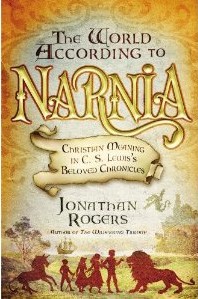We’re just a couple of days from the release of the Voyage of the Dawn Treader Movie. I’ve been reproducing the VDT chapter from my 2005 book, The World According to Narnia. The gist of the chapter is that VDT is all about finding your true self by forgetting yourself–by losing yourself in something bigger and more interesting than the cramped little self that the selfish always find themselves in. Part 2 from last week focused on Eustace and his recovery from stifling selfishness. This week’s entry is about Lucy in Coriakin’s house.
Eustace’s is the most fully developed case of self-absorption and its cure in The Voyage of the Dawn Treader, but two others deserve a closer look too. The first is that of Lucy reading Coriakin’s book of spells. One of the most remarkable things about this episode is the fact that it is Lucy who falls victim to vanity. Lucy is the most spiritually sensitive and spiritually mature of the characters in the Chronicles of Narnia. And yet even Lucy is not immune to the sins of self-centeredness and vanity.
Lucy finds herself flipping through the book of spells for wholly noble reasons. She has shown considerable bravery coming into Coriakin’s house to reverse the spell that made the Duffers invisible and thereby to save her shipmates who are being held hostage. But she is enchanted by the book of enchantments.
She lingers over the spell that would make her beautiful beyond the lot of mortals. Its accompanying pictures depict her, Lucy, changing the spell “with a rather terrible expression on her face,” then becoming a dazzling beauty—so dazzling that the real Lucy has to look away. But the book also shows the terrible effects of such beauty. Kings throughout the Narnian world fight for her, and whole kingdoms are laid waste on her account. She sees herself back in England, where she eclipses Susan, the beauty of the Pevensie family. And not only is the Susan in the picture less beautiful than the beautiful Lucy, she is less beautiful than the real Susan, and she wears a “nasty expression” on her face. She is jealous of her little sister, “but that didn’t matter a bit, because nobody cared anything about Susan anymore.”
It’s a little jarring to know that Lucy could harbor such selfish thoughts. It’s even more jarring to see that Lucy, having observed the harm that kind of beauty would bring on other people, seems determined to say the spell in spite of her conscience. It’s the worst sort of self-aggrandizement, this conscious wish to gain at others’ expense. But Aslan intervenes. When Lucy sees the Lion’s snarling face, she knows not to carry out her plan.
Aslan does allow her next act of poor judgment, however. By way of consolation for being denied beauty beyond the lot of mortals, Lucy says the spell that will let her hear what her friends think about her. This spell doesn’t threaten to cause geopolitical upheaval like the last one, but it does cause considerable sorrow for Lucy. When she hears what her friends say behind her back, she learns the danger of knowing that which is not hers to know.
The next page of the magician’s book, by Aslan’s grace, contains a spell “for the refreshment of the spirit.” It’s a very different spell from the other two that have enchanted Lucy. Those spells promised her power. They put her in the position of actor, put her at the center of things. Remember the picture of Lucy, terrible in her power, chanting the beauty spell. But this spell puts Lucy in the posture of recipient rather than actor. It’s more story than spell, and as she reads the story, she loses herself in it. The story-spell offers the refreshment and release of forgetfulness. Lucy forgets, in fact, that she is even reading. She is living the story; she has left her world of self-imposed sorrows. Having laid aside the will to exert her own power, Lucy is again in a position to receive Aslan’s blessings.
When Lucy speaks the spell to make invisible things visible, Aslan appears. He has been there all along. And when Lucy sees him, his face is lit by a beauty like the beauty of the Lucy in the picture. True beauty comes not through the self-conscious rituals of vanity, but through the joy of the Lion. It’s no minor detail that when Lucy’s face does take on beauty beyond the lot of mortals, she doesn’t even realize it. The misery brought on by her eavesdropping seems far away as Lucy loses herself in Aslan.
One can hardly remain self-conscious in the presence of such a terrible and joy-giving being as Aslan. Lucy “bur[ies] herself in his shining mane.” She has died to self. She asks if she will ever be allowed to read the story that had so refreshed her spirit. “Indeed yes,” answers Aslan, the story’s Author. “I will tell it to you for years and years.” For years and years she will live in a story so beautiful that she won’t even bother to think about what anyone but Aslan thinks of her. That is paradise indeed.








